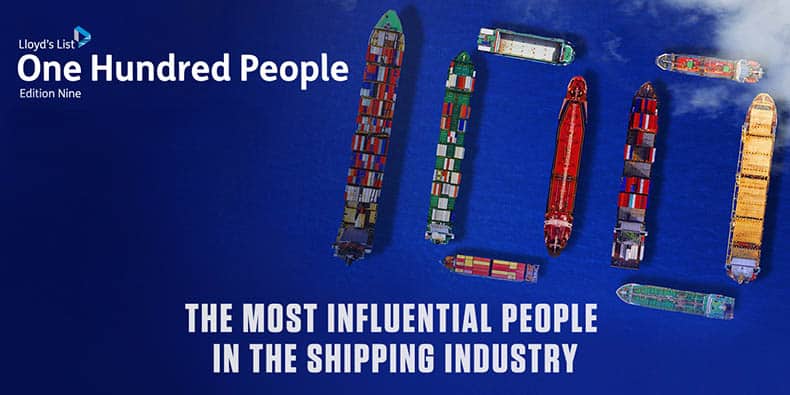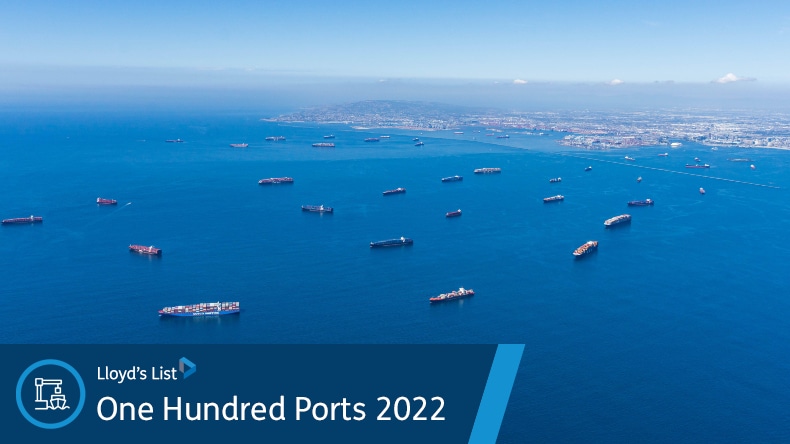
Individual actions still matter in shipping, even as shipowners’ power is waning. Yet this year’s defining moment has come from the EU, which has overtaken the IMO as the most influential force in the industry, by taking tangible action to address climate change
IT has been a consistent theme of this annual ranking of influence in shipping that the power of the individual is waning.
The headline challenges of decarbonisation and digitalisation require collective action and a shipping industry that is working collaboratively as part of an integrated global value chain.
However, we are not there yet — and this year’s Lloyd’s List Top 100 depicts an industry struggling with transition.
Change is being forced upon the sector from regulators, financiers and customers. The agency of individual actors to determine their fate within that context is increasingly limited, regardless of scale.
And yet, as ever, this annual assessment of influence and power within the maritime space finds a cast of resolute movers and shakers navigating an age of uncertainty with characteristic flair and an impressive dash of chutzpah.
Collaboration may be the key to unlocking a more sustainable future, but individual actions still matter in shipping, even as the industry’s power bases visibly shift in this list each year.

The headline that shipowners are no longer calling the shots is not new news. Cargo owners’ expectations have been driving decisions for some time now, and the flow of finance and cargo are both the carrot and sticks being deployed to force change through a cautious ownership landscape petrified of investing in stranded assets.
The shifting tide of power is not immediately noticeable in daily headlines — but viewed over a year and across the industry, patterns start to emerge.
With the introduction of new regulations, such as the Carbon Intensity Indicator and European Emissions Trading System, the nature of the conversations between owner and charterer is having to evolve.
Incentivising owners and charterers to share the responsibility of creating a more efficient supply chain would be more immediately influential in emissions terms than the prospect of a potential carbon price sometime in the future.
The industry is still in the realm of evolution rather revolution in 2022, but there is a recognition from this year’s Top 100 that business models are having to adapt.
The natural conclusion of much of this change will increasingly challenge mid-sized private entities that have dominated shipping’s fragmented business models for much of the past century.
Some names are notably absent from the list this year and the general trend at the top of the list is clearly towards scaled operations, regardless of public or private structures.
Lending to shipping has already begun to hinge on shipowners’ ability to satisfy the banks’ environmental, social and governance criteria and, as the net closes in on the slew of greenwashed positioning statements, it is going to become increasingly difficult to escape the scrutiny that requires actual progress rather than empty promises.
The reality right now is that you have two shipping industries visible: those companies that are trying to run modern, efficient fleets; and those that will not make changes until the regulation forces them to.
The ambition to decarbonise shipping is real, but the editorial board members assessing this year’s rankings have tried to focus on action rather than pledges.
That is why the top slot for 2022 has been issued to the European institutions that have achieved what was unthinkable only a few years ago and dragged the shipping industry into its carbon markets.
This is no longer the realm of debate; this is now a question of legal responsibilities.
Shipping’s inclusion in the ETS will have a tangible impact on the industry in terms of compliance, but the wider significance of this watershed moment in shipping politics is that is shows regional regulators that you can price pollution beyond your borders.
As a well-timed challenge to the International Maritime Organization poised to revise its climate ambitions, the EU Council, Commission and Parliament have collectively pulled off an impressive agreement that will determine the immediate future of this industry — and potentially others.
They have effectively shown the world how to set legally binding targets to reduce maritime greenhouse gas emissions.
Outside of the headline news that the EU has usurped the IMO to become the most influential policy-making body in the shipping industry, this year’s list features a familiar parade of names, each struggling to balance the long-term transition of decarbonisation with the more immediate challenges of what has passed for business as usual in 2022.
The economic headwinds of war, inflation, pandemic and a supply chain crisis still unwinding have tempered the more exuberant predictions of progress this year, particularly in China.
Concerns over China’s economic prospects are mounting, with bigger risks lurking beneath the slowdown. Shipping that relies on this vast market on many fronts should take note.
Draconian lock-downs and an ailing property market are seen among the biggest factors weighing on the country’s economy. Both are the results of heavy-handed policing.
While Wan Min and Miao Jianmin, the respective heads of China’s state-owned conglomerates Cosco and China Merchants, have come in at number two in the Top 100 list in 2022, the influence they collectively represent is not entirely of the ilk for which they would like to be recognised.
Their sheer size and reach across shipping bear significant influence alone and is why the two giants have become a staple in our top 10 over the years. Yet this year’s positioning also reflects how the policies of Beijing continue to have a key bearing on the fortunes of shipping globally.
Beijing’s heavy-handed response to recent civil unrest, in protest of draconian Covid measures, gives an indication that the government is unlikely to change policy any time soon. Further disruption to shipping can certainly not be discounted in the months ahead.
Add to this the US-Sino struggles for supremacy and escalating war rhetoric over Taiwan, and China’s domestic and foreign policies add a deep layer of uncertainty for global shipping — one that will be among the top areas of concern.
Of course, these are only a few of the narratives shaping the Top 100 in 2022.
Elsewhere, Lloyd’s List has included some familiar faces and old hands still making their mark on the industry — and some not so familiar, whether from the new generation disrupting shipping through tech and innovation, or of individuals that have enjoyed a stellar year or hit the headlines over the past 12 months.
Female representation is also at an all-time high, but it is still nowhere near where it needs to be. This list does not profess to be an objective ranking of the industry’s power base, but it does reflect the lack of diversity still plaguing its boardrooms.
More than 25 women are represented among our industry cast this year – a figure stark in contrast to the meagre two highlighted only a decade ago during the fledgling years of this annual ranking. However, we are under no illusions that this represents an acceptable situation for shipping or this list.
And, while we are noting the industry’s shortcomings, a new entry among our annual breakout lists this year is that of dishonourable mentions. The list names and shames those in shipping hitting the headlines for all the wrong reasons. Inclusion here is certainly not a proud moment.
( SOURCE: Lloyd’s List annual Top 100 finds shipping struggling with transition )

One Hundred – Edition Thirteen – lloydslist.maritimeintelligence.informa.com
The 13th edition of Lloyd’s List’s One Hundred People, ranking influence and power within shipping, features a familiar cast of characters and some maybe not so familiar, reflecting the next generation making a mark on the industry.
However, each is struggling to balance the long-term transition of decarbonisation with the more immediate challenges of what has passed for business as usual in 2022. Individual actions still matter in shipping, even as shipowners’ power is waning. Yet 2022’s defining moment has come from the EU, which has overtaken the IMO as the most influential force in the industry, by taking tangible action to address climate change.
The Lloyd’s List for 2022:
1 – Ursula von der Leyen, Magda Kopczynska, Frans Timmermans and Adina Vălean, European Commission
2 – Wan Min and Miao Jianmin – Cosco / China Merchants
3 – Søren Skou and Robert Uggla – AP Moller Holding / AP Moller-Maersk
4 – Aponte family – Mediterranean Shipping Co
7 – Eyal and Daniel Ofer – Zodiac Maritime
8 – Idan Ofer – Eastern Pacific Shipping
9 – John Fredriksen – Fredriksen Group
10 – Maria Angelicoussis – Angelicoussis Shipping Group
11 – Kitack Lim – International Maritime Organization
13 – Rasmus Bach Nielsen – Trafigura
14 – Grimaldi family – Grimaldi Group
15 – George Prokopiou – Dynacom / Dynagas / Sea Traders
16 – Rolf Habben Jansen – Hapag-Lloyd
17 – Jeremy Nixon – Ocean Network Express
18 – Michael Parker – Citigroup / Poseidon Principles
19 – Angeliki Frangou – Navios Group
20 – Guy Platten – International Chamber of Shipping
21 – Andreas Sohmen-Pao – BW Group
22 – Xu Bin and Zhang Zhenghua – Bocomm / ICBC
23 – Melina Travlos – Union of Greek Shipowners
24 – Kang Seog-hoon – Korea Development Bank
25 – Wu Fulin – Export-Import – Bank of China
26 – Bing Chen and David Sokol – Seaspan / Atlas Corp
28 – Erik Woodhouse – Division for Counter Threat Finance and Sanctions
30 – Hugo De Stoop – Euronav
31 – George Economou – TMS Group
32 – Alexander Saverys – Compagnie Maritime Belge
33 – Johannah Christensen – Global Maritime Forum
34 – Chung Ki-sun and Ka Sam-hyun – Korean Shipbuilding and Offshore Engineering
36 – Ma Yongsheng – Sinopec Group
37 – Kostis Konstantakopoulos – Costamare
38 – Daniel Maffei – Federal Maritime Commission
39 – Henning Oldendorff – Oldendorff Carriers
40 – Peter G. Livanos – GasLog / DryLog
41 – Evangelos Marinakis – Capital Group
43 – Takeshi Hashimoto – Mitsui OSK Lines
44 – Emanuele Lauro and Robert Bugbee – Scorpio Group
46 – Peter Voser – PSA International
48 – Jan Swartz, Michael Bayley and Frank Del Rio – Princess Cruises / Royal Caribbean Cruises / Norwegian Cruise Line
49 – Lois Zabrocky – International Seaways Inc
50 – Stephen Cotton – International Transport Workers’ Federation
52 – Dr Tristan Smith – UCL Energy Institute
53 – Nick Brown – Lloyd’s Register / IACS
55 – Katharine Palmer – Lloyd’s Register / United Nations
56 – Li Tianbi – Water Transport Bureau at China’s Ministry of Transport
58 – Gary Brocklesby and Nicolas Busch – Navig8 Group
59 – Christian Ingerslev and Eva Birgitte Bisgaard – Maersk Tankers
60 – George M. Logothetis – Libra Group
61 – Chang Kuo-hua – Evergreen Group
62 – Rajalingam Subramaniam – MISC
63 – Tom Crowley – Crowley Maritime
64 – Mark Jackson – Baltic Exchange
67 – Bo Cerup-Simensen – Maersk Mc -Kinney Møller Center for Zero Carbon Shipping
68 – Rebeca Grynspan – United Nations Conference on Trade and Development
69 – Ann Fenech – Comité Maritime International
70 – Alfonso Castillero – Liberian Shipping and Corporate Registry
71 – Uwe Lauber – MAN Energy Solutions
72 – Kristin Holth – Serial non-executive director
73 – Semiramis Paliou – Diana Shipping / Helmepa
74 – Juliet Teo – Temasek Holdings
75 – Ernst Meyer – Torvald Kaveness
76 – Mark O’Neil – Columbia Shipmanagement / Intermanager
77 – Mudit Paliwal – Delta Corp Holding
79 – Lynn Loo – Global Centre for Maritime Decarbonisation
80 – Thomas Wilhelmsen – Wilh. Wilhelmsen Holding
82 – Andrew Wright – The Mission to Seafarers
83 – Elpi Petraki – and Despina Panayiotou Theodosiou – Wista
85 – Sultan Ahmed bin Sulayem – DP World
86 – Hope Hicks – US Merchant Marine Academy graduate
87 – Christian Oldendorff – Amplifier and Reederei Nord
88 – Dorothea Ioannou – The American P&I Club
89 – Noah Silberschmidt – Silverstream Technologies
90 – Andrian Dacy – JP Morgan
91 – Elisabeth Munck af Rosenschöld – IKEA
92 – Gary Vogel – Eagle Bulk Shipping
93 – Cleopatra Doumbia-Henry – World Maritime University
94 – Birgit Liodden – The Ocean Opportunity Lab
96 – Alessio La Rosa – Cofco International
97 – Abdullah Fadhalah Al-Sulaiti – Nakilat
98 – Rajesh Unni – Synergy Marine Group
99 – Nancy Karigithu – State Department of Shipping and Maritime Affairs, Kenya
100 – Igor Tonkovidov – Sovcomflot
(SOURCE: Lloyd’s List’s One Hundred People, ranking influence and power within shipping)
SEE ALSO: Lloyd’s List’s One Hundred Container PORTS





Find all top providers of Marine Navigation products & services for safe Maritime Voyage Planning